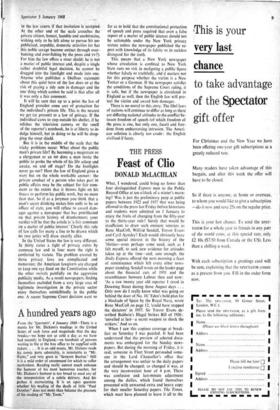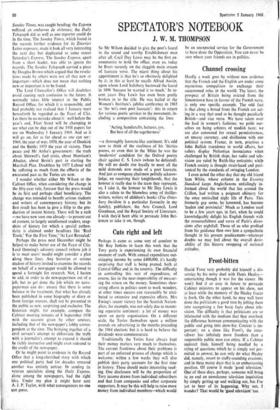Feast of Clio
THE PRESS DONALD McLACHLAN
What, I wondered, could bring no fewer than four distinguished Express men to the Public Record Office at ten o'clock of a winter's morn- ing? Was it just the preliminary peep at public papers between 1922 and 1937 that was being allowed to the press last Friday before historians and students were admitted on 1 January to enjoy the fruits of changing from the fifty-year to the thirty-year rule? Surely that would be insufficient to draw such eminent veterans as Rene MacColl, Wilfrid Sendall, Trevor Evans and Cyril Aynsley? Each would obviously have some special interest in the history of the 'thirties—even perhaps some need, such as I felt myself, to seek new evidence for attitudes taken, up at the time—and, sure enough, the Daily Express offered the next morning a feast of reminiscence which left every other news- paper standing. Sendall wrote on the leader-page about the financial cuts of 1931 and the resemblances between Labour then and now: 'As a raw twenty year old reporter I stood in Downing Street during those August days . . . Only now do I really know what was going on behind the door of No. 10.' Eden's bold plan for a blockade of Spain by the Royal Navy, wrote Rene MacColl on page 12, 'could have stopped the dictators' in 1937. Sir Trevor Evans de- scribed Baldwin's Illegal Strikes Bill of 1926: `unveiled at last—a secret weapon to shock the strikers.' And so on.
When I saw this copious coverage at break- fast on Saturday I was puzzled. It had been understood that the preview of selected docu- ments was embargoed for the Sunday news- papers. But during the morning of Friday, it is said, someone in Fleet Street persuaded some- one in the Lord Chancellor's office that the arrangement was unfair to the daily papers and should be changed; so changed it was, at the very inconvenient hour of 4 p.m. There was confusion and last-minute adjustment among the dailies, which found themselves presented with unwanted extra and heavy copy for their smaller Saturday papers. The Times, which must have planned to leave it all to the
Sunday Times, was caught bending; the Express suffered an embarras de richesses; the Daily Telegraph did as well as one reporter could do in the time. The Sunday Times, which found in the records further evidence for its Zinoviev Letter exposure, made it look all very interesting the next day but duplicated to some extent Saturday's Express. The Sunday Express, apart' from a short leader, was able to ignore the records. The Sunday Telegraph carried a piece by Douglas Brown which argued that the revela- tions made by others were not all that new or important—which does not mean that nothing new or important is to be found.
The Lord Chancellor's Office will doubtless avoid causing such confusion in the future. It; normally takes little interest in the Public Record Office, for which it is responsible, and had probably not realised that 1 January must henceforth be regarded as the Feast of Clio. Let there be no mistake about it: well before the year's end, Fleet Street will be champing to see what can be dug out of the 1938 papers for use on Wednesday 1 January 1969. And so it will go on, for as far ahead as one can see: 1969, the year of war; 1970, the year of Dunkirk and the Battle; 1975 the year of victory. Then peace and Mr Attlee's government : the truth about Shinwell's fuel crisis, about Morrison's Abadan, about Bevin's part in starting the Marshall Plan. Doubtless by 1977 Labour will be suffering as much from the effluvia of the excavated past as the Tories are now.
I wonder whether either Mr Wilson or the Cabinet Office, when considering the change in the fifty-year rule, foresaw that the press would be its first and perhaps chief beneficiary. The change was intended to benefit serious students -and writers of contemporary history; but its first result has been to give a fillip to the pro- duction of instant history. There will be a rush have now seen one already—to present out of context, to largely uninformed readers, snap- shots of history for which a special authen- ticity is claimed under headlines like 'Real Truth,"For the First Time,"At Last Revealed.'
Perhaps the press next December might be helped to make better use of the Feast of Clio. Lord Denning's advisory council (whose job it is to meet users' needs) might consider a plan along these lines. Any historian or serious student of history invited to examine the records on behalf of a newspaper would be allowed to spend a fortnight for research. Not, I hasten to add, in order to do newspapermen out of a job, but to get done the job which no news- paperman can do : ensure that there is some balance in the treatment, that what has already been published in some biography or diary or from foreign sources, shall not be presented to the public as new, surprising and exclusive. The historian might, for example, compare the Cabinet meeting minutes of 8 September 1938 with the account given by other sources, including that of the newspaper's lobby corres- pondent at the time. The bringing together of a civil servant's attempt to abbreviate the truth with a journalist's attempt to expand it should be richly instructive and might even redound to the credit of the newspaper.
Or he might point to evidence in the Record Office that a long-cherished story with which one political party had for decades smeared another was entirely untrue. In sending its veteran specialists along the Daily Express, alone among the newspapers, had the right idea. Under my plan it might have sent A. J. P. Taylor, with what consequences no one can guess-



































 Previous page
Previous page